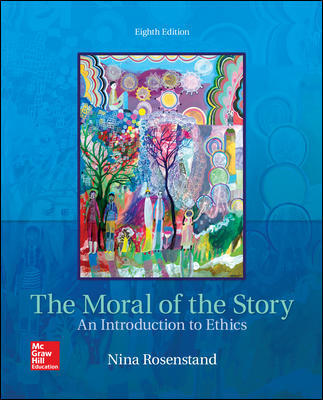In Stock
Test Bank For The Moral of the Story An Introduction to Ethics 8th Edition By Nina Rosenstand
Digital item No Waiting Time Instant DownloadISBN-13: 978-1259907968 ISBN-10: 9781259907968
Original price was: $55.00.$28.00Current price is: $28.00.
Test Bank For The Moral of the Story An Introduction to Ethics 8th Edition By Nina Rosenstand
Chapter 02 Learning Moral Lessons from Stories
1. The moral of the fable “The Boy Who Cried Wolf” is that you should never lie, because sooner or later people aren’t going to believe you anymore, even when you tell the truth.
TRUE
Accessibility: Keyboard Navigation2. The criminal justice system has recently begun to experiment with sentencing convicted offenders to reading books and watching films in order to teach them moral responsibility.
TRUE
Accessibility: Keyboard Navigation3. There is a difference between stories that moralize and stories that discuss moral problems.
TRUE
Accessibility: Keyboard Navigation4. A didactic story is a story that teaches a lesson.
TRUE
Accessibility: Keyboard Navigation5. According to neuroscience, humans are hard-wired to tell stories so as to make sense of their lives.
TRUE
6. There is a sharp distinction between factual and fictional stories.
FALSE
Accessibility: Keyboard Navigation7. Even stories that are believed to be factual have an element of poetic creativity.
TRUE
Accessibility: Keyboard Navigation8. Traditional myths have two purposes: to strengthen social bonding among people and to fortify the individual psychologically.
TRUE
Accessibility: Keyboard Navigation9. Fairy tales have been described by psychoanalysts as pure wishful thinking.
TRUE
Accessibility: Keyboard Navigation10. “Reality shows” are scripted to a great extent and their content and structure are heavily edited to keep the audience’s interest.
TRUE
Accessibility: Keyboard Navigation11. The story of the prodigal son belongs to the category of parables.
TRUE
Accessibility: Keyboard Navigation12. Kierkegaard believed that Abraham’s obedience to God was not an example of ordinary morality but required a leap of faith.
TRUE
Accessibility: Keyboard Navigation13. The anthropologist Carol Delaney asks why over the years hasn’t anyone wondered how Sarah felt about Abraham’s willingness to sacrifice her only child.
TRUE
Accessibility: Keyboard Navigation14. Western films (stories of the American West) have changed very little over the last century.
FALSE
Accessibility: Keyboard Navigation15. Western movies often feature a story of an individual vs. larger forces.
TRUE
Accessibility: Keyboard Navigation16. Crime stories generally concern themselves with the battle between good and evil.
TRUE
Accessibility: Keyboard Navigation17. The science fiction genre sometimes referred to as “cyberpunk” portrays a dark and frightening future.
TRUE
Accessibility: Keyboard Navigation18. We can learn moral lessons from morally good people but not from morally flawed people.
FALSE
Accessibility: Keyboard Navigation19. If one is opposed to war, one can find no moral lessons in war stories.
FALSE
Accessibility: Keyboard Navigation20. The Western Unforgiven with Clint Eastwood provides a strong pro-violence statement.
FALSE
Accessibility: Keyboard Navigation21. The story of the Golem figure teaches a lesson of keeping a moral perspective in our undertakings.
TRUE
Accessibility: Keyboard Navigation22. The Pygmalion story type is a warning against unscrupulous creativity: You may be creating a monster.
FALSE
Accessibility: Keyboard Navigation23. In the novel The Sorrows of Young Werther, Werther kills his beloved Lotte because she has broken up with him.
FALSE
Accessibility: Keyboard Navigation24. Plato claimed that art is harmful because it inspired violent emotions.
TRUE
Accessibility: Keyboard Navigation25. Aristotle’s idea of catharsis meant that we should purge all sex and violence from art.
FALSE
Accessibility: Keyboard Navigation26. Aristotle viewed art as dangerous because it inspired violent emotions.
FALSE
Accessibility: Keyboard Navigation27. Greek drama began as religious pageants at the annual festival of Dionysus in Athens.
TRUE
Accessibility: Keyboard Navigation28. As a young adult, Oedipus is told that he is destined to kill his father and marry his mother.
TRUE
Accessibility: Keyboard Navigation29. Oedipus unwittingly kills his adopted father to fulfill the prophecy.
FALSE
Accessibility: Keyboard Navigation30. Aristotle believed that a good tragedy doesn’t have to rely on what we today would call special effects.
TRUE
Accessibility: Keyboard Navigation31. Socrates was the student of Plato, who was himself the student of Aristotle.
FALSE
Accessibility: Keyboard Navigation32. Rosenstand suggests that children need to be taught by their parents to process stories so that they will know the difference between fact and fiction.
TRUE
Accessibility: Keyboard Navigation33. Rosenstand suggests that stories are to be seen as moral laboratories where we can explore the consequences of actions.
TRUE
Accessibility: Keyboard Navigation34. Aristotle claims that, “Dramatic poetry had a most formidable power of corrupting even men of high character. . . .”
FALSE
Accessibility: Keyboard Navigation35. Plato warns against the dangers of letting one’s emotions run free when watching a tragedy, but he also warns against laughing when watching a comedy.
TRUE
Accessibility: Keyboard Navigation36. Umberto Eco, in The Name of the Rose, creates a pastiche of Aristotle’s lost work on comedy.
TRUE
Accessibility: Keyboard Navigation37. Raymond Chandler’s description of the fictional detective suggests that the detective should be a perfect human being.
FALSE

Reviews
There are no reviews yet.